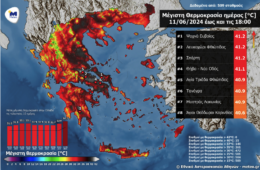The country will remain in a heatwave, with the heat wave advancing until Friday. A peak of very high temperatures will occur today and tomorrow, with the mercury soaring, reaching 42 degrees Celsius in some areas. The highest temperatures will occur in the interior of mainland Greece, mainly in the central and southern regions, in areas unaffected by the sea breeze. The explosive cocktail of heatwave and very high fire risk forecast in 7 regions has put the state mechanism on heightened alert.
At the same time, primary schools will remain closed due to the heatwave across Greece. At the same time, measures have been taken in secondary education in order for examinations to be held without any problems and without endangering the health of children. According to the schedule, the school year ends on Friday 14 June for kindergartens and primary schools, meaning that the heatwave is likely to bring the end of the year prematurely. High schools and middle schools will be operating normally, across the country. In many municipalities, classes in kindergartens and elementary schools are suspended after 11.30am.
It is recalled that the responsibility for school closures at the local level lies with the municipalities in consultation with the Region. The Ministry of Education will only intervene in the case of a universal closure of schools. (See here which schools will be closed and which will remain open in Attica, the Peloponnese, Thessaly, northern Greece and Crete)
According to the Emergency Weather Bulletin issued by the National Weather Service (EMY) on Monday (10/6) and updated:
Today (12-6-2024) and tomorrow (13-6-2024) temperatures will peak both in terms of maximum and minimum values.
α. In the northern mainland the maximum temperature will reach 37 to 39 degrees Celsius and in central Macedonia locally on Wednesday 40 degrees Celsius, while the minimum values will be around 25 to 27 degrees Celsius.
Close
β. In western Sterea and western Peloponnese the maximum temperature will reach 38 to 40 degrees and in Thessaly 41 to 42 degrees with minimum values of 26 to 28 degrees Celsius.
c. In eastern Sterea and eastern Peloponnese the maximum temperature will reach 41 to 42 degrees and in some places 43 degrees, while the minimum values will be around 27 to 29 degrees Celsius.
d. In the island country the maximum temperature will reach 35 to 37 degrees Celsius, in the islands of the eastern Aegean and the Dodecanese 38 to 39 degrees Celsius, while locally in Crete it will reach 40 to 42 degrees Celsius. The minimum values will be around 27 to 29 degrees Celsius.
ε. In Attica the maximum temperatures will reach 40 to 41 degrees Celsius in the interior and 42 degrees Celsius on Thursday, while in the coastal areas it will be 3 to 5 degrees lower.
3. On Friday (14-6-2024) the temperature will drop in the west, central and northern regions, but in other areas it will remain at very high levels, while from the afternoon hours a change of weather is expected in northern Greece with thunderstorms accompanied by strong winds.
α. In the northern mainland the maximum temperature will reach 34 to 36 degrees Celsius, while the minimum temperature will be around 24 to 26 degrees Celsius.
β. In the rest of the mainland the maximum temperature will reach 36 to 38 degrees Celsius, in the interior of Sterea, Thessaly and Peloponnese 39 degrees Celsius, while the minimum values will be around 25 to 27 degrees Celsius.
c. In the island country the maximum temperature will reach 34 to 36 degrees and in the islands of the eastern Aegean, the Dodecanese and Crete 37 to 39 and possibly 40 degrees, while the minimum values will be around 27 to 28 degrees Celsius.
It is noted that at the weekend throughout the country, the temperature will drop by 6 to 8 degrees and will return to normal for the season. At the same time, strong northerly winds will prevail.
Very high fire risk in Attica, Corinthia, Boeotia, Fthiotida, Fokida, Larissa and Magnesia
Very high fire risk (risk category 4) is predicted today according to the Fire Risk Prediction Map issued by the General Secretariat of Civil Protection of the Ministry of Climate Crisis & Civil Protection (civilprotection.gov.gr) for the following areas of the country:
* Region of Thessaly (PE Larissa, PE Magnesia)
* Region of Central Greece (PE Boeotia, PE Fthiotida, PE Fokida).
* Region of Attica
* Region of Peloponnese (PE Corinthia)
The General Secretariat of Civil Protection (civilprotection.gov.gr) of the Ministry of Climate Crisis & Civil Protection has informed the competent government departments involved, as well as the Regions and municipalities of the above areas, in order to be on increased civil protection preparedness in order to deal immediately with any fire incidents.
The 2nd stage of operational readiness of the Civil Protection Service has been put in place and air surveillance patrols will be carried out, as well as patrols by fire, police and military forces.
In addition, the personnel of the Fire Services of the above mentioned Regional Units are put on partial alert in order to cope with the increased service requirements that may arise due to the very high fire risk (risk category 4).
At the same time, for the above areas, the Civil Protection Action Plan for dealing with forest fire risks is being implemented, according to which, among other things, the implementation of the measure of preventive prohibition of vehicle traffic and the stay of excursionists in national parks, forests and “vulnerable” areas is foreseen.
At the same time, the GGP recommends that citizens should be particularly careful and avoid actions in the countryside that can cause a fire through negligence, such as burning dry grass and branches or cleaning debris, using spark-generating machinery such as circular saws, welding devices, the use of outdoor barbecues, smoking bees, throwing lit cigarettes, etc. It is also recalled that during the fire season, burning of fields is prohibited.
In addition, the Fire Brigade appeals to citizens:
1. To be particularly careful and avoid any activity that could cause a fire to break out.
2. Monitor the information on forest fire prevention available on the website and on the official accounts of the Fire Department, Facebook and Twitter.
3. If they become aware of a fire, they should immediately notify the Fire Department at the 199 call number.
Finally, the Fire Brigade calls on all citizens to be particularly careful and in case of fire, for their own safety, to follow the instructions of the competent authorities.
For more information and instructions for self-protection from the dangers of forest fires, citizens can visit the website of the General Secretariat for Civil Protection at www.civilprotection.gr.
Civil Protection recommendations to citizens on the heatwave
At the same time, recommendations to citizens to be particularly cautious, ensuring that they take measures to protect themselves from the risks posed by the prevalence of high temperatures, is addressed by the General Secretariat for Civil Protection.
In areas where high temperatures are forecast to prevail, the Secretariat draws the attention of people belonging to vulnerable groups to be particularly careful in the coming days in order to avoid health problems, such as heat exhaustion and heat stroke, which may be caused by the high temperatures that will prevail.
In particular, in accordance with the instructions for self-protection against high temperatures, citizens are advised to:
* Remain in cool and shaded areas away from crowded conditions, use air conditioners or fans, and avoid heavy physical labor in areas with high temperatures, lack of air and high humidity.
* Avoid sunbathing, such as walking or running in the sun, and wear a hat and sunglasses and light-colored clothing made of fabric that allows the skin to ventilate and facilitates the evaporation of sweat, avoiding synthetic fabrics.
* Eat light meals of fruit and vegetables, limiting the amount of fat and the quantity of food.
* Drink plenty of water and fruit juices, avoiding alcohol.
Particular care is recommended for babies and young children, as well as the elderly and those suffering from chronic diseases to protect them from high temperatures
For more information and guidance on self-protection from high temperatures, citizens can visit the website of the General Secretariat for Civil Protection at civilprotection.gov.gr and the following document of the Ministry of Health “Prevention of the effects of high temperatures and heatwaves”:
https://diavgeia.gov.gr/doc/%CE%A8%CE%A4%CE%97%CE%93465%CE%A6%CE%A5%CE%9F-%CE%97%CE%9A%CE%9D?inline=true
Specific issues concerning the prevention of heat stress of workers are given in the following document of the Ministry of Labour & Social Security “Prevention of heat stress of workers”:
https://diavgeia.gov.gr/doc/%CE%A1%CE%931%CE%9D46%CE%9D%CE%9B%CE%94%CE%93-%CE%A9%CE%9F6?inline=true
Yesterday the temperature exceeded 41 °C, up to 40 degrees in Attica – 146 meteo.gr/E.A.A.A. stations with temperatures above 37 °C
Very high temperatures were recorded by the meteo.gr/National Observatory of Athens network of automatic meteorological stations on Tuesday 11/06, with the mercury exceeding 41 °C in the eastern mainland. In addition, the average maximum temperature in the country was equal to 34.7 °C, while 146 out of 509 active stations (at the present time) recorded temperatures above 37 °C.
Finally, the 5 highest maximum temperatures in Attica were as follows: Pallini – 40.1 °C, Fili/Ano Liosia – 40.1 °C, Spata – 39.9 °C, Vlychada – 39.6 °C and Korydallos – 39.6 °C. It is noted, however, that in the southern coastal parts of Attica (Faliro, Alimos, Agios Kosmas, Sounion) the maximum temperatures did not exceed 34 °C.

Crete: New developments in the murder of Jean Harlon – The killer has been identified, says her son
The weather today
A few clouds are expected throughout the country, which will increase in places during the warm hours. In the northwestern highlands showers or isolated thunderstorms may occur. Increased concentrations of Saharan dust in the atmosphere.
The temperature will range in Western Macedonia from 12 to 35 degrees, in the rest of northern Greece from 16 to 37-39 degrees, in Epirus from 16 to 38-40 degrees, in Thessaly from 16 to 40-42 degrees, in the rest of the mainland from 19 to 39-42 degrees, in the Ionian Islands from 18 to 36, in the Aegean islands and Crete from 18 to 36-38 degrees, while in the Eastern Aegean the maximum will reach 41 degrees Celsius in some places.
Winds will blow in most areas of the country from the south with intensities of 3-5 Beaufort. The exception will be the southern parts of the Aegean where winds from the west will prevail with the same intensity.
FORECAST FOR THURSDAY 13-06-2024
In the west central and north thin clouds, sometimes more dense with a chance of rain, mainly in the continental mountains. In the remaining areas generally clear weather.
Meteorological conditions favour the transport of African dust throughout the country.
Winds will be variable 3 to 4 and in the central and northern Aegean Sea from the afternoon south 4 to 5 Beaufort and in the southeast north 4 to 6 Beaufort.
The temperature will rise, mainly in the south and will be very high.
Specifically, in the northern mainland will reach 37 to 39 degrees Celsius, in western Central and western Peloponnese 38 to 40 degrees, in Thessaly 41 to 42 degrees, eastern Central and eastern Peloponnese 41 to 42 degrees and in some places 43 degrees Celsius. In the island country the temperature will reach 35 to 37 degrees Celsius, in the eastern Aegean islands and the Dodecanese 38 to 39 degrees Celsius and locally in Crete 40 to 42 degrees Celsius. In Attica the maximum temperatures will reach 40 to 42 degrees Celsius in the interior, while in the coastal areas it will be 3 to 5 degrees lower. Note that the minimum temperature will also be very high and will be around 26 to 29 degrees Celsius.
FORECAST FOR FRIDAY 14-06-2024
In the west central and north, partly cloudy with local rain or rain, mainly in the northern mainland, while in the northern mountains there will be occasional thunderstorms. Improvement of the weather is expected in the evening hours from the west-northwest.
Winds in the west will blow north at 5 to 6 and locally 7 Beaufort, while in the east they will initially blow from the west southwest at 5 to 6 Beaufort and from the afternoon north at the same intensity.
Temperatures are expected to show a slight decrease in the west, central and northern areas, but in the rest of the regions will remain very high. More specifically, in the northern mainland the maximum temperature will reach 34 to 36 degrees Celsius, in the rest of the mainland 36 to 38 degrees Celsius, while in the interior of Sterea, Thessaly and Peloponnese 39 degrees Celsius. In the island country it will reach 34 to 36 degrees Celsius and in the eastern Aegean islands, the Dodecanese and Crete 37 to 39 and possibly 40 degrees Celsius. Minimum temperatures in the northern mainland will be around 24 to 26 degrees Celsius and in the rest of the country around 25 to 28 degrees Celsius.
Ask me anything
Explore related questions





